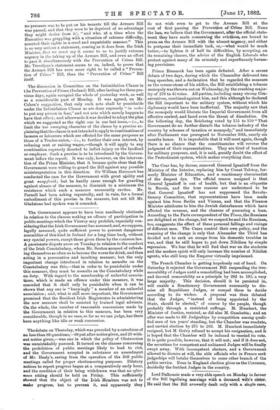Lord Dalhousie made a very able speech on Monday in
favour of the Bill legalising marriage with a deceased wife's sister. He said that the Bill avowedly dealt only with a single case, instead of putting the change of law on any great principle, because the case with which it was drawn to deal was the only one in which the grievance of the present prohibition was severely felt. In all our larger colonies,—all the colonies, indeed, except some of those of South Africa,—a marriage with a deceased wife's sister is now legal. The existing law is widely set at defiance ; but he wished the law altered, not because it had been often broken, but because public opinion sustained those who broke it. In London alone there were 5,000 couples who had married in defiance of the law, and in a little place like Stratford-on-Avon there were no fewer than twenty each couples. He was him- self acquainted with thirteen men who had married their sisters-in-law, and in many of these cases it was at the request, sometimes at the death-bed request, of their wives. In the case of the upper classes, the grievance was not great, for these satisfied their consciences by getting married abroad ; and in all the great Continental countries these marriages were either absolutely lawful, or only needed a dispensation from the civil power, which it was easy to get; but in the case of the poor, where the need for a sister-in-law's presence in the house was mach more urgent, it was impossible to adopt the expensive expedient of going abroad to marry, and consequently it too often ended in connections which were not marriages at all. The practical conditions of the case showed that whether such marriages are desirable in themselves pr not, neither public opinion nor public expediency justifies the prohibition which at present renders them unlawful, but which does not prevent the connections which it is intended to prevent, and does brand with illegitimacy numbers of innocent children whose parents society does not condemn.



































 Previous page
Previous page